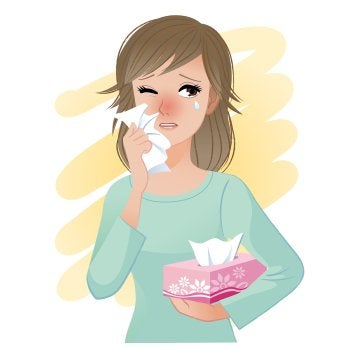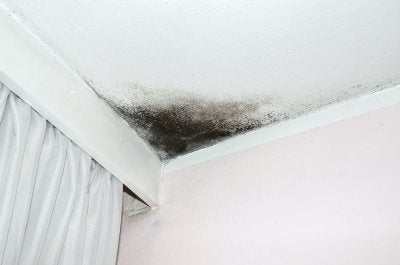-
Angie’s List Mold Remediation
Large amounts of mold can cause serious health concerns as well as extensive harm to your home. If you suspect that there is mold in your home, it is best to get it under control before it can harm you, your family, or your property. Luckily, working with a company that conducts mold inspections in San Francisco can help keep your family safe. Watch this video to learn why you should act quickly to control mold.
Asthma, allergies, and skin rashes can be black mold symptoms. If you know you have mold, you can try to remove it on your own by eliminating the source of moisture, but mold remediation professionals can help to eliminate it completely. The costs of working with a professional can vary depending on the scope of the job, but it will help to keep your family safe and healthy.
-
Frequently Asked Questions About Mold
Most people understand that mold does not belong in their home, but they may not understand exactly why. If you are on the fence about getting a mold inspection near San Francisco, you may want to learn more about what mold in your home can mean for you and your family. In order to help you gain a wealth of knowledge about mold, here are the answers to some frequently asked questions on the topic.
Who is Affected by Mold?

Mold exposure can make you and your family extremely ill. If you have young children or infants in your home, they are very susceptible to theeffects of mold , as are the elderly. Also, if you have anyone in your home who has a suppressed immune system or asthma, mold can negatively affect them.Why Does Mold Grow?
In nature, mold is very important. It grows in order to help the decomposition of leaves, trees, and other plants. In nature, mold grows in areas with high moisture content. Mold is not hazardous in small amounts; however, in large amounts it can pose a threat to you or your loved one’s health.Where Can Mold Be Found?
Everyone is exposed to mold every day, but in small doses. In your home, it is possible for large amounts of mold to build up. Mold can be found in your carpets, on your walls, appliances, or your floors. Just as in nature, mold will thrive in damp places such as your bathroom, kitchen, or basement.How Can You Treat Mold?
Mold will grow anywhere that conditions are suitable for it. There is no stopping mold completely, but you can take action against it. If you suspect that there are large amounts of mold in your home, working with a company that specializes in mold inspections can help you control it. They can help you identify your home’s problem areas and should also be able to help you remove the mold. -
Bacteria Testing 101
Every home has bacteria, and many types of bacteria can even be good for you and your family. However, some bacteria can be hazardous to your health. Fortunately, companies that specialize in mold and asbestos testing in San Francisco often can also test for harmful bacteria in your home. To learn about bacteria testing, keep reading.
Like asbestos testing, getting a bacteria test performed in your home can help to protect your family from health hazards. There are generally two types of assessments that should be made. The first is a preliminary bacteria/sewage assessment. This assessment will check to see if sewage indicator bacteria are present in your home. The other assessment is a follow-up assessment to determine that the remediation efforts were successful. This assessment will take surface samples to make sure there are no sewage indicator bacteria present. If the first assessment was done correctly, your home will be cleared.

-
Understanding the Symptoms of Black Mold Exposure
Black mold is more than just an unsightly nuisance in your home. When your property is affected by black mold, you and your loved ones could be at risk of developing black mold symptoms. Since black mold spores are highly toxic to humans, prolonged exposure to areas that are contaminated with mold could lead to serious health problems. If you or a loved one are experiencing mold symptoms , you should be sure to set up a mold inspection in San Francisco. To help you decide whether your home is in need of black mold testing, here is a closer look at some of the most

common mold symptoms.
Respiratory Symptoms
Respiratory symptoms are among the most common indicators of a reaction to toxic black mold . When a person is sensitive to mold, he or she may develop problems breathing, as well as a continual cough. In certain cases, black mold has also been linked to other serious health issues, such as pulmonary edema and asthma. If you or a loved one is having difficulty breathing in your home, you may have a black mold issue.Circulatory Symptoms
Black mold can affect a person’s circulatory system, as well as his or her breathing. Some of the common signs of circulatory issues include low blood pressure, difficulty with blood clotting, or internal bleeding. Since these circulatory problems can potentially become quite serious, it is a very good idea to set up a mold testing appointment at the first sign of black mold in your home.Eye and Skin Symptoms
Exposure to black mold can also lead to irritation around the eyes and on the skin. For example, black mold may cause a person to develop itchy or watery eyes. In addition, repeated exposure to black mold spores can also lead to dermatitis and other skin related issues. If you are concerned about protecting your family from these black mold symptoms, you should be sure to set up a black mold testing appointment today. -
Black Mold Health Symptoms
Mold poisoning can cause a variety of health problems. Often, mold exposure can result in allergic reactions. For example, you may experience, sneezing, coughing, or itchy and watery eyes. Additionally, black mold can worsen symptoms of sinusitis and asthma. If you have been experiencing health symptoms such as these at home, you may be eligible for a mold inspection. A company offering mold testing near San Francisco can provide you with a complete and thorough mold inspection for your home. After your mold testing has been completed, you will be ready to start the mold removal process. To learn more about some of the health symptoms of black mold, check out this video from ehowhealth.
-
The Dangers of Mold Exposure
For people who do not have asthma or allergies, exposure to mold oftentimes does not result in any unpleasant symptoms. But for those who have asthma or mold allergies, mold symptoms can be severe. To learn more about mold poisoning and other dangers of mold exposure, watch this video—and for a professional mold inspection in San Francisco , contact Safe Air Fast.
Mold exposure can be very harmful if you have asthma, a chronic lung condition, or a weak immune system. These pre-existing conditions can increase the likelihood of developing a mold infection in the lungs. If you have one of these pre-existing conditions and you believe you are in contact with mold at home or at the office, call a mold testing company right away.
-
Mold and Your Health
Most common molds do not pose a health concern to people who are generally healthy. But for those who have existing health concerns, mold exposure can bring on a host of health issues. To learn more about mold and your health, and the importance of routine mold testing in San Francisco , read on.
Mold Symptoms
People who have allergies or asthma may experience a number of mold symptoms , including skin rash, runny nose, eye irritation, itching, cough, asthma aggravation, and congestion. Those with an immune suppression or lung disease may be at a greater risk for infections from mold exposure. Other serious health resulting from mold exposure include fatigue, coughing up blood, nose bleeds, dizziness, diarrhea, vomiting, liver damage, headaches, fever, and flu-like symptoms.
fever, and flu-like symptoms. Microbial Volatile Organic Compounds
Also known as mVOCs, Microbial Volatile Organic Compounds can cause a number of health problems caused by exposure to mold. Produced by fungal metabolism, mVOCs are released into the air and give off a strong, unpleasant odor. Exposure to mVOCs that exist in mold can irritate the respiratory system and eyes. It is common for mVOCs to cause headaches, nasal irritation, nausea, fatigue, and dizziness.Seeing a Doctor Regarding Mold
If you believe you are exposed to mold in your home or business, visit a family or general health care provider. He or she can refer you to an allergist who treats mold allergies or an infectious disease physician who treats mold infections. The doctor will be able to administer a test to see if you have been exposed to mold. He or she can also determine if you are allergic to mold by using a skin or blood test.What to Do if You Suspect Mold in Your Home or Business
If you believe mold is inside your home or workplace, schedule a mold inspection with Safe Air Fast to ensure the mold is removed. At Safe Air Fast, we perform mold investigations and mold cleaning services. -
Understanding the Mold Inspection Process
If you are experiencing headache, fever, congestion, or fatigue, there is a chance that your body is reacting to mold exposure. Fortunately, these symptoms will go away if you find the source of the mold and eliminate it. The first step to treating mold is to schedule a mold inspection near San Francisco . In this article, we will review the mold inspection process and why it is so important.
Detecting Mold
The first step in the mold inspection process is realizing that you need a mold test. Most people realize they need a mold test when they smell mold—it has a distinctive odor that’s musty and damp. Other people recognize the need for a mold inspection when they experience mold symptoms like the ones listed above, or when they see mold on the walls, in corners of the room, or on objects.
Locating Mold
When the mold testing specialists arrive in your home, they will look in some of the popular hiding places for mold. It is common for mold to grow under carpets or carpet pads, behind draperies and wallpaper, under wood, behind drywall and wallboard, on pipes, above ceiling tiles, and in ductwork.Cleaning Mold
Getting rid of mold entails both removing it and eliminating the conditions that caused it to grow. Determining what type of mold you have is not as important. Moldy areas must be treated with biocide; otherwise, mold can continue to make you sick even after it dies. To keep mold from growing back, dry wet spots within 48 hours, and keep your indoor humidity between 30 and 50 percent.Post-Clean Test
Mold testing is a good way to make sure your home or business is mold-free after a mold cleaning. At-home mold-testing kits do not provide the level of detailed testing that comes with a professional mold assessment. A professional mold test is especially important if your home has suffered from water damage, as it is very difficult to fully test for mold with an at-home kit. -
Spotlight on Mold Remediation
After a mold inspection uncovers mold on your property, you will need to act fast to prevent wood rot and other structural issues. In addition, a mold problem could lead to symptoms of black mold poisoning, including respiratory issues and allergy symptoms. To eliminate a mold problem, you can start by removing all moisture from your home. Your remediation specialist may also apply a fungicidal spray to the affected areas of your property. Once your mold removal procedure has been completed, you can check to see if it has been successful by scheduling a mold inspection. A post-remediation mold inspection will give you the peace of mind that comes from knowing that your mold issue has been fully eliminated. A company offering mold testing near San Francisco can provide you with a full range of inspection services. To learn more about mold remediation, check out this video from ABC Action News.
-
Is Your Mold Remediation Covered By Insurance?
When a mold inspection turns up a problem in your home, it is time to act fast and schedule mold remediation services. Your mold testing company will be able to pinpoint the precise location and extent of your mold damage. After your mold inspection near San Francisco, you may want to contact your insurance company to see whether your remediation will be covered by your insurance plan. With proper recovery, you can prevent your family from being affected by black mold symptoms. Here is a look at how to determine whether your mold remediation is covered by insurance.
Determine the Source of the Mold Problem
The first step of making a mold claim on your homeowner’s insurance is to uncover the precise source and
cause of your mold issue. Since mold requires moisture in order to grow, there is a good chance that your mold problem has been caused by a flooding leak, environmental problem, or other unforeseen issue. Depending on the type of insurance that you have for your home, the source of your mold problem may determine the amount of coverage you receive.
Investigate Your Insurance Policy
Once you have determined the source of your mold problem, your next step will be to investigate the terms of your homeowners insurance policy. Each insurance plan provides different forms of coverage, depending on the reason that your mold problem occurred in the first place. For example, if your mold problem was caused by neglectful maintenance, you may not have coverage.Consider Adding Mold Coverage
To ensure that you are covered for any future mold damage to your home, you may want to consider taking out additional mold coverage for your home. When you add mold coverage to your insurance policy, you will be covered for any scenario that could cause a mold infestation in your home. With this type of insurance, you can rest assured that you will be able to start on your mold remediation as soon as your inspection is completed.
RECENT POSTS
categories
- Uncategorized
- Lead
- Mold
- San Francisco Mold & Asbestos Removal
- Indoor Air Pollution
- Mold Remediation
- Asbestos
- Safe Air Fast
- Mold Inspection
- Remediation
- Bacteria Testing
- Asbestos Testing
- Abatement
- Lead Testing
- Sewer Line
- Lead Survey
- Mold Testing
- Air Quality Inspection
- Home renovations
- Allergies
- Renovation Contractor
- Infographic
- lead paint
- Air Quality
- Air Quality Test
- Mold removal
